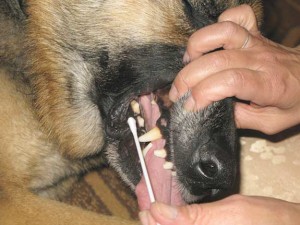Why DNA Health Screenings Help Herding Breeds Stay Healthy
DNA breed tests for dogs are a useful tool if you want to know more about your all-American pound puppy, but what if you're already 99.99% certain you're the parent of a purebred herding breed? Is genetic testing still useful?
The answer is a resounding “Definitely!”
Inherited Disease DNA Health Screenings Help Herding Breeds Stay Healthy
For many years, dog and cat breeders have been using DNA health screening tests to avoid producing animals with certain inherited diseases. Today, the average pet parent is also encouraged to take these DNA health screening tests as a way to make better health care decisions for their animals.
Basic pet DNA tests like the the Mars Pet Care Wisdom Panel Analysis offer breed analysis and one or two additional health screenings, like checking for the Multidrug Sensitivity (MDR1) gene mutation, which makes herding breeds susceptible to serious, and sometimes fatal, side effects caused by certain drugs (like the heartworm drug Ivermectin).
But if you're ready to go a step further, you can opt into a wider assortment of tests for your herding breed. Canine inherited disease screening tests offered through vet labs like DDC Diagnostics Center (DDC) can help you better manage common herding breed health care disasters that might be looming in your dog's future.
These at-home DNA tests are easy to do. Do you remember junior high biology class, when you had to collect cells from your cheek by scraping a cotton swab against the inside of your mouth? The DNA screening process is just like that, only this time you swab your pet’s cheek with sterile swabs sent by the lab after you pay for the test. After sending the swabs back to the lab, you'll have the test results in a couple of weeks.
Does Your Herding Breed Have Degenerative Myleopathy?
With a simple cheek-swab, you can take the Canine-Disease-Degenerative Myelopathy DNA Test to find out if your herding breed is a carrier of Degenerative Myleopathy. This is a brutal, degenerative and fatal disease of the spinal cord that kills thousands of dogs each year. While it was thought to be mainly German Shepherd Dogs, it has recently been discovered in other herding breeds, as well.

Since DM symptoms tend to develop later in a dog's life, pet parents of the affected dog are usually caught off-guard and thrown into crisis mode by the tragic diagnosis. On the other hand, if a symptomatic dog is already known to be 100% at-risk of DM, those pet parents will be better prepared with the health information needed to manage the debilitating symptoms for as long as possible.
Can Your Collie be a von Willebrand's Disease Carrier?
Another inherited disease screening that herding breed pet parents will find useful is the DNA screening test for von Willebrand’s Disease (vWD), the most common inherited bleeding disorder in canines. Within the herding dog world, it especially affects Pembroke Welsch Corgis, Collies and the Shetland Sheepdog.
Knowing if your dog has this gene is a matter of life and death – affected dogs are susceptible to blood clotting and bleeding abnormalities that can be fatal if the condition goes undetected. Even the most simple surgical procedures like neutering, or dental cleanings can put a von Willebrand's dog's life at risk. Competent vets will screen for vWD before surgery, but why not do this test yourself ahead of time to avoid unnecessary delays?
After the Inherited Disease Screening: What to Do with the Information?
Agreeing to an inherited disease DNA health screening test comes with a complex set of emotional choices for us, such as:
- If you find out your dog is predisposed to certain herding breed diseases, what will you do about it?
- Will you arm yourself with information about the disease and be ready for battle?
- Or will you constantly worry, looking for signs that your pet is showing symptoms of the condition?
- Do you really want to know if your herding breed has certain diseases?
The test results can provide useful information as our herding dog ages, but the decision to screen for inherited diseases isn’t for everybody. If a DNA health screening test comes back with results that you didn't expect, are you ready for the next step?
Article By:
Rene Agredano






